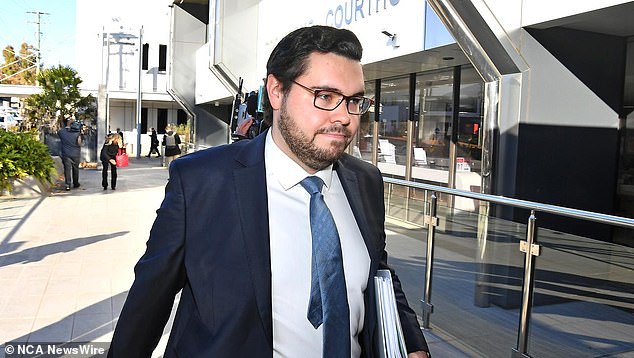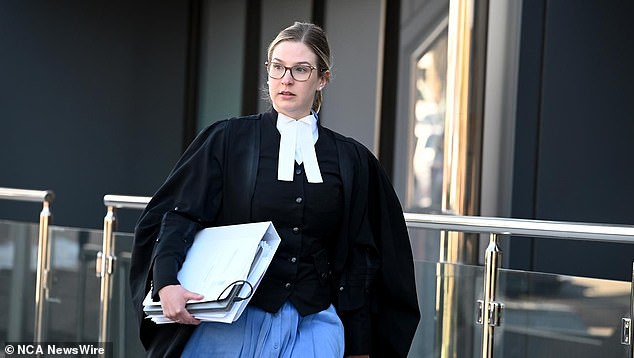Court hears the four words Bruce Lehrmann is accused of saying as he allegedly raped a woman in 2021
The woman who claims she was raped by former parliamentary staffer Bruce Lehrmann claims he said four words while having sex with her without her consent, a court has heard.
Mr Lehrmann appeared in Toowoomba District Court last month for a preliminary hearing in connection with the two rape offences, which police say occurred in the regional Queensland city three years ago.
It was the first time he had appeared in court in person since the charges were filed last year.
Mr Lehrmann was excused from the court hearing on Thursday and instead appeared remotely by telephone.
When asked if Mr. Lehrmann wished to enter a plea, he told the court, “Not at this time, thank you, Your Honor.”
Mr Lehrmann’s legal team argued that he did not have to answer to the court on Thursday.
Public prosecutor Nicole Friedewald said the case against Mr Lehrmann includes two counts of rape.
Bruce Lehrmann is expected to learn in 2021 whether he will stand trial in a higher court for allegedly raping a woman. Photo: NewsWire/John Gass
The first charge alleges that the plaintiff “woke up” to find Mr. Lehrmann allegedly having sex with her without her consent.
The woman then allegedly stopped Mr Lehrmann from having sex with her by saying: “Stop, what are you doing?” Ms Friedewald told the court.
The second charge against Mr Lehrmann is that a few moments later he had sexual intercourse with the woman again, without her consent.
Ms Friedewald said the complainant told police that during the second incident she was “not enthusiastic” while Mr Lehrmann allegedly had sex with her.
Ms Friedewald told the court that the woman also claimed that while this was happening, Mr Lehrmann was ‘comforting her throughout the act’ by telling her ‘it’s OK, it’s OK’ and that he was not using a condom at the time.
“She described her body as limp and that she was not enthusiastic. He continued to have sex with her until he came inside her,” Ms Freidewald said.
The court was told that while the couple had consensual sex after meeting hours earlier, the prosecutor will argue that the complainant did not consent to sex after she woke up.

Mr Lehrmann first appeared in Toowoomba District Court in June since the charges were filed, but has been excused from Thursday’s hearing. Photo: NewsWire/John Gass
Mr Lehrmann’s lawyer, Andrew Hoare KC, said the complainant’s statements to others contradicted what she herself said when she reported the incident to police on November 26.
Mr Hoare said that about two hours after the alleged assault, the complainant was filling out forms at a chemist’s where she wanted to buy the morning-after pill.
The court considered that the form provides an opportunity for a person to select “sexual abuse” as a reason for using emergency contraception.
“The complainant does not tick that box, and it has to be said that ticking a box is very different from any story,” Mr Hoare said.
Mr Hoare told the court the woman also failed to report the alleged assault to her doctor during the various appointments between the alleged incident and the first report to police.
It will be alleged in court that Mr Lehrmann gave the woman the false name ‘Bryce’ when the two met, before clarifying that his name was ‘Bruce’.
The court was told that the complainant had also spoken to a friend about the incident before reporting the matter to police.
“In addition, there is the intervention of the complainant’s (friend) who records the complainant’s state of mind,” he said.
‘It is (the friend) who suggested that (the complainant) was sexually abused and only after that the (accusation of) sexual abuse is made.
‘Her uncertainty about the events themselves, and certainly until (her friend) comes clean, shows that she is not subjectively convinced that she was sexually abused.
‘What is being said is that the claim that the complainant now makes in relation to the first point is inconsistent with the disclosures that she has made to others and with a document that she herself has drawn up, which is the reason why she wants the morning-after pill.’
The court was told that the prosecutor first spoke to a civil lawyer and a criminal lawyer before speaking to police the day after she discovered who Mr Lehrmann was.
The court was told that the complainant had been drinking alcohol and taking cocaine before meeting Mr Lehrmann at the nightclub.
The court also heard that the two used cocaine together before having sex.
Mr Hoare said the complainant’s alcohol and drug use could explain why she could not remember some of the events in the bedroom with Mr Lehrmann.
“The doctor’s conclusion is that the plaintiff, even in the absence of memory, is capable of assent to the circumstances surrounding the act now the subject of the complaint but cannot remember them,” Mr Hoare said, referring to a medical expert who testified about the effect of alcohol and drug use on a person’s memory.
The court was told that while the expert witness had not analysed the woman’s medical records, he had given his professional medical opinion on the alleged scenario of that night and how alcohol and drug use can lead to “fragmented memory loss”.
Ms Friedewald said the prosecution would argue that although consent had initially been given for the first sexual act, the complainant’s actions after she woke up or regained consciousness should have indicated to Mr Lehrmann that he had no further consent to have sex with her.

Prosecutor Nicole Friedewald. Photo: NewsWire / John Gass
“While there is some contextual relevance that they had consensual intercourse, that does not mean that there was consent for every act in every form of intercourse or penetration,” she said.
‘As for the plaintiff’s statement, it is clear and unequivocal that she was unconscious at the time of (the first charge of rape).
“If the jury can accept her testimony, they can also accept that she was not a consenting party to the act.”
Ms Freidewald said it was also “not unusual” for an alleged rape victim not to report the matter immediately.
Referring to the fact that the complainant told her friend about the interaction with Mr Lehrmann, Ms Freidewald said the messages between the two women were “important” because they showed that the friend had not “planted the idea of sexual abuse or rape in the complainant’s mind for the first time”.
The court was told that the complainant had responded to her friend’s message asking her to report the incident to the police with “who is going to believe me”.
During the final hearing on June 17, one witness, the complainant in the alleged case, was questioned by Mr Lehrmann’s legal team in closed session.
Media companies including News Corp Australia filed a request with the court asking for evidence given behind closed doors to be reported during the hearing.
Attorney Jessica Goldie, representing the media, argued that the measure would not be detrimental to the complainant.
She told the court that the presence of media at the hearing would ensure that there was a fair and accurate report of the proceedings and would also allow the media to fulfil its public duty of ‘appropriately reporting’ alleged serious sexual offences.
“They both reflect the principles of open justice, which is an important fundamental principle of our legal system,” Goldie said.
Ms Goldie said Mr Lehrmann’s case was unique and had received significant national and media attention.
But Mr Lehrmann’s lawyer, Andrew Hoare, said there was a risk the complainant could be identified from her statement.
The Crown also opposed the request, telling the court that the complainant herself had objected to the request in order to protect her privacy.
Magistrate Mark Howden ultimately dismissed the request, arguing that there was an important public interest at stake.
‘However, according to the court, no basis has been put forward that would change the position that the complainant’s interests would not be harmed by this.
“I think the matter should be handled in the normal way.”
Mr Lehrmann was charged in December 2022 with raping a woman in Toowoomba in October the previous year.
When he first appeared in court in January 2023, Mr Lehrmann was referred to in media reports about the charges only as a “prominent person”, due to Queensland laws that prohibit people accused of prescribed sex offences from being identified before they stand trial.
But this legislation was amended by the state government on October 3 last year.
Mr. Lehrmann’s legal team then filed a last-minute lawsuit in the state Supreme Court in an attempt to protect his identity.
This non-publication order was later revoked.
